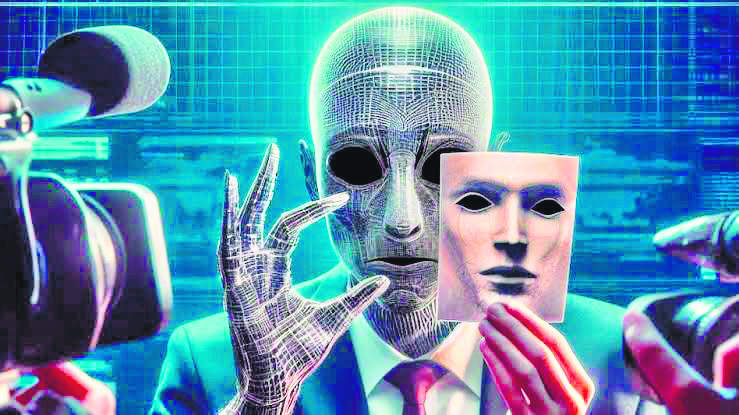‘Many companies are bringing technologies to identify whether the video is AI-generated or not.’
NEW DELHI
Through generating deep-fake videos and threatening to upload that on social media platforms, fraudsters are extorting money from people who do not understand this new phishing scam. “The scammers now simply do a video call on a social media platforms such as Facebook or WhatsApp, and then in the call, a nude female or something similar is shown. After the call ends, a morphed video and picture of the individual can easily be generated with the help of deepfake AI technology. The extorter then asks for some amount to delete the video. If the individual pays the amount, the fraudster will continue to threaten the individual. If he does not pay, the photo or video will be posted on the internet. There are many such cases that are not reported to the police because the individual is not aware of such technology and the individual is embarrassed sometimes,” added a police official who oversees such cases.
One such case came to light in Ghaziabad, where a senior citizen was targeted for extortion, pushing the 76-year-old man to make repeated payments under the false impression that he was dealing with a genuine police officer. In a complaint to the police, the daughter of the senior citizen, stated that her father was initially contacted by criminals through a Facebook video call and explicit content was displayed in the same call. After disconnecting the call, Sharma soon received a WhatsApp video call featuring an individual clad in police uniform. The fake police officer, leveraging the identity of an IPS officer, issued threats of filing a complaint against Sharma unless he accepted their monetary demands. “In the video, the individual in uniform threatened to file a complaint against my father unless he paid them. He also mentioned that he would expose a video of my father conversing with women on social media and would even share it with family members,” she stated in her complaint.
The case comes at a time when Union IT Minister Ashwini Vaishnaw had said that the government would form rules to crack down on deepfakes and its misinformation on social media. The minister held a meeting last week with representatives of social media companies after actor Rashmika Mandanna’s deep-fake video was widely circulated online.
“Many companies are bringing technologies to identify whether the video is AI-generated or not,” said Hariom Seth, founder of Tagglabs, a pioneer in AI technology. Seth also stated that the scammers target that part of the population that is unaware of the AI technicalities and easily fall into their trap. Such people do not report it to the police because they are not aware of the technology. If the person is aware of this, the scammers will try to scam them. But if they are vocal about such scams, they will not be able to scam that person, as it will be a hit-or-miss thing for them. Seth also commented that earlier there were not many tools. But now one can tell if the video is made with AI or if it’s shot from a camera with the help of available tools. There is a meta code for every type of video, and it is not the same for different devices used in shooting videos. The meta code of a video shot from a DSLR camera will be different from that of a video shot from a smartphone. Similarly, it will be different for AI-generated video. Seth further added that such technology was limited to forensic experts earlier, but now it is becoming popular due to these deep-fake AI-generated videos and photos. Some social media platforms are integrating this technology so that people remain aware of whether the video was actually shot or an AI-generated video.

